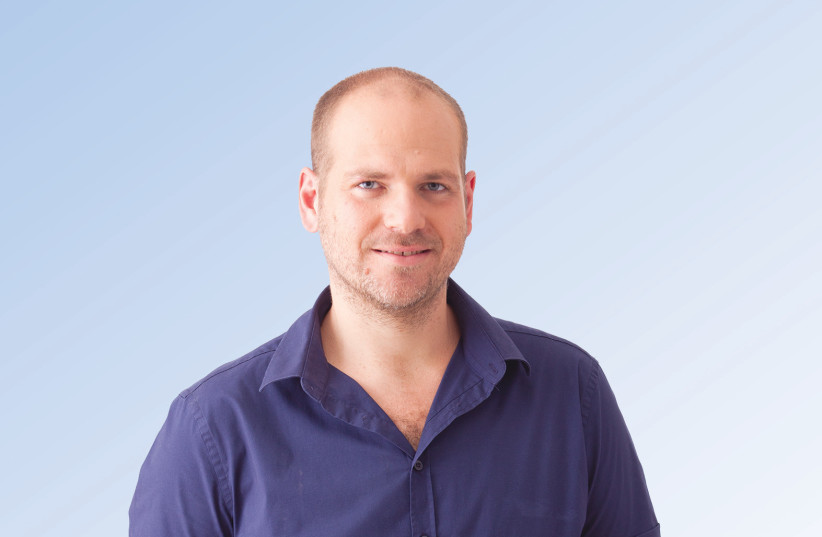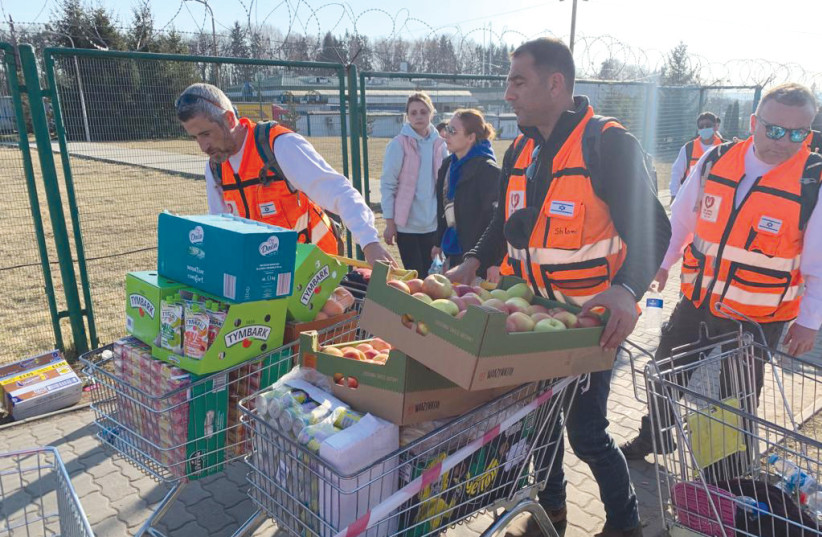Invasion of Ukraine: A Jewish state cannot stand aside.
That is the motto of a group of young men and women, and quite a few not so young also, for whom this statement was not just a slogan, but something binding – so binding that they got up, left everything behind – work, families, studies – and traveled to the Polish-Ukrainian border to help the tens of thousands of refugees fleeing for their lives from the Russian invasion. Lev Echad (One Heart), easy to identify by the vests with the organization’s symbol, is at the Polish-Ukrainian border trying to alleviate their suffering.
The first time Lev Echad appeared was in 2005, with the Disengagement from Gush Katif. “We realized that a crisis had arisen,” recalls Tomer Dror, a Jerusalemite who was also among the first to create the Hitorerut movement, and was its CEO for a few years. Dror, 36, a communications consultant and campaign manager, recalls how it started.
“It was a state of national emergency, beyond the various political positions – for or against the evacuation. We were a bunch of caring young people, graduates of the Ein Prat Midrasha, we were motivated to bring the spirit that led us during our stay at the seminary – to act for the sake of society, for a better society, for the State of Israel, in order to be the exemplary society it should be.
“And we realized that the state was not prepared for the consequences on the ground of the government’s move – to evict 8,000 people from their homes – and we realized pretty quickly that the state had no answer to this aspect. We started from scratch but in a very short time we were thousands coming from all over the country and we organized to help on the social side the people whose lives had changed dramatically. So, we mobilized to give of ourselves and thus the organization was born.”

Dror says the organization is strictly based on volunteers, and that it only operates in times of distress. “Israel is a country that is often in a state of emergency. From this experience, we learned how to help on a practical level with citizens. This includes [helping] children, assisting the elderly, [having an] awareness of needs that arise in an emergency situation that a state cannot provide,” continues Dror.
In between those times of emergency, it’s as if the organization does not exist, because there is no hierarchy of paid positions or a mechanism that requires it to operate continuously. “Whenever something happens, our volunteers come and start working,” Dror explains.
There are about 100,000 people who volunteer for the organization, but of course not all of them are active at the same time. Over the years, more professional volunteers have also joined, and older people too, adding to the organization’s range of possibilities. But the bulk of the volunteers are still mostly young people, before or just after their military service.
Today, in Ukraine, there are also volunteers aged 50 and up along with 18- and 19-year-old Ein Prat students. Some of the volunteers – and the demand is great – are experts in emergency situations, while others can speak the local languages in order to mediate in the field. Mainly, the volunteers need creativity and an open heart.
“This is an exemplary organization and now even more so because the operation took place in a place where this is not our war and for the sake of many people who are not Jews at all, and that is the main thing here,” adds Dror.
All of Lev Echad’s activities are funded by donations, with funds coming from all sectors of society. “It’s all donations. When there is no emergency there is no need for money and when something happens we call for donations.”
But, what makes Lev Echad special?
“With the war in Ukraine, we discovered that we could also help on an international level,” answers Dror. “That’s one thing. But the major issue is who we are and why we are doing this. The understanding is that this war is indeed not ours but also relevant to us. There is a war going on here between the values of the West that we want to be a part of versus a world of dictatorship and evil. It is a war between good and evil. And we are on the side of freedom, because we believe that Israel was established, not only to be a refuge for the Jews, but also to be an exemplary society and a light unto the nations – the existence of Israel is not only as a national home, but also as a gospel to the world. Call it by all sorts of names, we call it a light unto the nations.”
EITHER BEFORE or after their time in Ukraine, the volunteers visit Auschwitz. Dror was there this year on Holocaust Remembrance Day: “It was important to me to do a ceremony together with the Ukrainians. One of our partners there, Wald, said at the ceremony that he grew up on stories of his grandfather, who saved Jews in the Holocaust, and here I was, telling him with his friends around him, about how the Jews are helping in the Ukrainian war... now.”
Ahuva Zarfaty, a high school teacher in Mishor Adumim and a resident of Alon, a village near the Ein Prat seminary, recently came back after spending a week in Ukraine. The 56-year-old says she decided to go there because she didn’t want to be among those who, like what happened during the Shoah, stood aside.
“I understand that at the national level there are many interests, but we, the citizens, cannot stand by and do nothing when such a terrible thing is happening. I went there and I felt I was making a difference with what happened. And, I could see that so many people from all of Europe, not all Jews, did the same – that’s what I believe we should all do. The State of Israel has its reasons, but I, as a Jew and a private citizen of Israel, cannot stand by.”
Lev Echad’s mission in Ukraine has a three-branch approach, explains Dror. First to assist the Ukrainians to establish their own volunteer organization according to Lev Echad’s model; secondly, to assist refugees at the border crossings and to provide them with a wide range of support, including providing hot meals and helping mothers take care of their children; and lastly, to stay with elderly refugees, who are suffering from loneliness due to the situation.
As for the Jewish aspect, to rescue Ukrainians who want to immigrate to Israel, Dror says there are currently three missions there helping to make that happen.
Each Lev Echad delegation to Ukraine runs for 10 days at a time with at least eight people. A delegation costs about $20,000 (NIS 69,000) to cover the flight, supplies and all of the volunteers’ expenses. So far, the cost of Lev Echad’s operations has reached $200,000 (NIS 690,000). Lev Echad is totally dependent on donations.
Dror points to the significance of being there when people become refugees and are threatened by a powerful enemy. “Wars and emergencies are a test for our humanity, resilience and values. Many Israelis rightly speak of the failure of the West in general and the United States in particular in this test. But, do Israelis who criticize Western leaders also look at us? I say that the State of Israel is probably one of the 20 most powerful countries in the world. We are a rich country, with a strong army, exceptionally smart citizens and advanced capabilities in almost all areas. Do we not also have a responsibility?”

Many of those who oppose Lev Echad’s (and additional such organizations’) intervention have based their position on the Holocaust. Firstly, because the Ukrainians were very cruel in the Shoah and were responsible for the extermination of hundreds of thousands of Jews, and secondly, because the Jewish people’s lesson from the Holocaust is that it should first and foremost take care of ourselves. Dror rejects this position, arguing that if the country bases its foreign policy on the events of the first half of the last century, it is better to end its relations with the overwhelming majority of European countries.
But, there is more.
“The purpose of Jewish independence, then, is not only to establish a strong state and army that will protect the Jews, but to set an example and be a role model for the rest of the nations of the world, to be a light unto the nations. A Jewish state has national and liberal-universal values, and therefore the whole world will enjoy its existence. What separates an exiled Jew from a sovereign Jew is not only his power and might, but also what he seeks to do with that power for the benefit of all members of the Israeli nation, Jews and non-Jews, and out of a determined responsibility for what is happening worldwide."
Finally, asked why he and all the many volunteers decide to leave everything behind even just for a week or so to help total strangers, Dror answers: "I had to answer this same question to my mother and my wife. It was easier with my wife. It was clear from the beginning why I am doing this. To my mother, I explained that all my wife’s family were murdered in Ukraine and there were some not-so-simple discussions, but I added that in another 20 years our children will ask us, ’when there was war, what did you do?’ I wanted to have an answer that we did good and also that Israel is a strong and rich state and hence has to be a light unto the nations. I can understand how it happens that people stand aside – without comparing anything. It’s hard to stop everything and go to help other people you don’t even know, but I didn’t want to be such a person.” ❖
